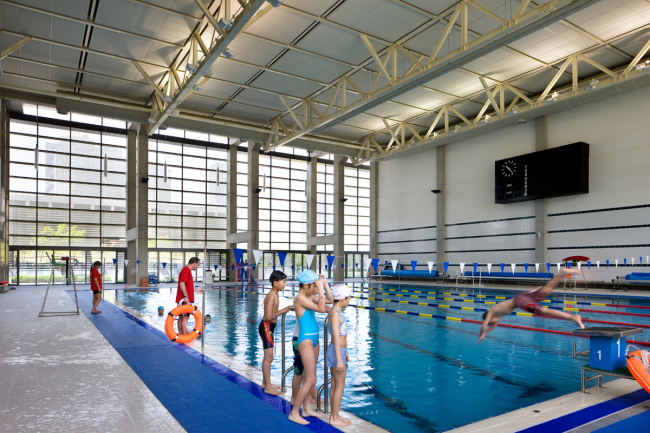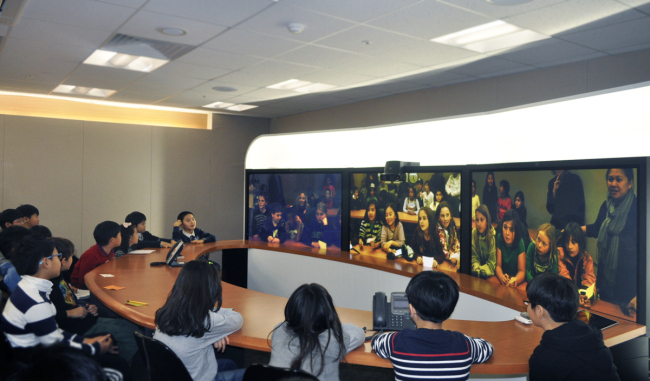[Weekender] Affluent parents seek edge in education
From international schools to tutors, well-to-do go extra mile for best education that money can buy
By Yoon Min-sikPublished : Oct. 10, 2014 - 20:28
Kim Hye-yeon, a 22-year-old student at Sogang University, visits a 3-year-old girl once a week. For two hours, she plays with her and reads to her as part of her “English tutor job.”
“I’m not really an ‘English tutor’ per se, more like a glorified babysitter,” she said.
Unlike conventional babysitting jobs, Kim’s work comes with a hefty price tag of 30,000 won ($28) per hour. It is not jaw-dropping but is more than most English tutors for high school students, which cost around 20,000 won and demand considerably more preparation.
Kim illustrates the lengths that affluent families in Korea are willing to go in a bid to make sure that their children gets the best education possible, no matter what form. “At this stage, it’s not like (parents are) pressured to force knowledge down their child’s throat. More like they’re trying to provide more opportunities for her,” she said.
The private education market in Korea has always flourished, with the annual figure north of 19 trillion won and education fees for toddlers and preschoolers standing at 2.2 trillion won. But for children of the well-to-do, the education can take a wide range of forms.
A few years ago, actress Cho Min-hee became the talk of the town after she revealed on a TV show that her daughter had received private lessons for jump rope. The lessons, which cost 70,000 won per 90-minute session, was to ensure that she would get top grades in physical education class at school.
Though the story was shocking to many, getting pricey tuition for non-academic schoolwork is a long-standing practice in Seoul’s affluent southern district of Gangnam. A 27-year-old former student athlete, who declined to be named, said he used to be a basketball tutor.
His pupils, however, were not Michael Jordan-wannabes, but students who just needed good grades. “Some of these ‘Gangnam moms’ will get tutors for anything and everything,” he said.
Of course, the “buying help for anything” approach can have side effects when it comes to children’s education.
“Excessive private education can deprive the students of their ability to educate themselves. Children who are spoon-fed their education from their early days often have trouble in later life, such as setting goals for themselves,” said An Sang-jin, an official from civic group A World Without Worries About Private Education.
Rather than sticking with Korea’s public education and supplement its shortcomings from the private sector, some parents turn their eyes outward toward pricey private schools in other countries, mainly the U.S., where average annual tuition can reach up to $38,000 in states like Vermont. The transition does not come cheap, but the well-to-dos spare no expense in getting their children the best foreign learning environment.
A 25-year-old recent graduate of a prestigious U.S. university said she made about 10 million won ($9,310) in three months while working as a tutor for a middle school student looking to be accepted at a top-ranking private high school in the U.S.
“I’m not really an ‘English tutor’ per se, more like a glorified babysitter,” she said.
Unlike conventional babysitting jobs, Kim’s work comes with a hefty price tag of 30,000 won ($28) per hour. It is not jaw-dropping but is more than most English tutors for high school students, which cost around 20,000 won and demand considerably more preparation.
Kim illustrates the lengths that affluent families in Korea are willing to go in a bid to make sure that their children gets the best education possible, no matter what form. “At this stage, it’s not like (parents are) pressured to force knowledge down their child’s throat. More like they’re trying to provide more opportunities for her,” she said.
The private education market in Korea has always flourished, with the annual figure north of 19 trillion won and education fees for toddlers and preschoolers standing at 2.2 trillion won. But for children of the well-to-do, the education can take a wide range of forms.
A few years ago, actress Cho Min-hee became the talk of the town after she revealed on a TV show that her daughter had received private lessons for jump rope. The lessons, which cost 70,000 won per 90-minute session, was to ensure that she would get top grades in physical education class at school.
Though the story was shocking to many, getting pricey tuition for non-academic schoolwork is a long-standing practice in Seoul’s affluent southern district of Gangnam. A 27-year-old former student athlete, who declined to be named, said he used to be a basketball tutor.
His pupils, however, were not Michael Jordan-wannabes, but students who just needed good grades. “Some of these ‘Gangnam moms’ will get tutors for anything and everything,” he said.
Of course, the “buying help for anything” approach can have side effects when it comes to children’s education.
“Excessive private education can deprive the students of their ability to educate themselves. Children who are spoon-fed their education from their early days often have trouble in later life, such as setting goals for themselves,” said An Sang-jin, an official from civic group A World Without Worries About Private Education.
Rather than sticking with Korea’s public education and supplement its shortcomings from the private sector, some parents turn their eyes outward toward pricey private schools in other countries, mainly the U.S., where average annual tuition can reach up to $38,000 in states like Vermont. The transition does not come cheap, but the well-to-dos spare no expense in getting their children the best foreign learning environment.
A 25-year-old recent graduate of a prestigious U.S. university said she made about 10 million won ($9,310) in three months while working as a tutor for a middle school student looking to be accepted at a top-ranking private high school in the U.S.

The occupations of parents who seek such tutors vary from high-level executives at large corporations to lawyers, but their general view toward education often differs from the general public. “Most people who get tutors have a realistic goal based on their children’s ability. These parents, however, have no regard for their children’s academic capacity. They just think the money will get the job done,” the graduate said.
The tendency to get the children educated from foreign-based institutions has increased over the past few years. Since 2000, 87 percent of the offspring of Korea’s top 30 conglomerates graduated from universities outside of Korea, according to recent data from Chaebul.com, which tracks the country’s conglomerates.
While some children from the superrich also get their secondary education in foreign countries, others choose bring foreign education to them by having their children enroll in international schools.
With its all-English classes, curriculum that challenges students to think creatively and freely express their ideas, low student-teacher ratio, and the high rate of graduates who go on to attend top-ranking foreign universities, these institutes have the appeal of giving students an education equivalent of leading private schools while never having to leave the country.
The yearly tuition for these institutes typically ranges between 20 million won to well over 30 million, making it virtually impossible for average-income citizens but highly appealing to families who can afford the sky-high fees.
Chadwick International in Songdo, for example, regularly invites highly reputed scholars to the school for events. Earlier this year, Pulitzer Prize-winning writer Adam Johnson visited the school for a lecture and an in-depth discussion with its students.

These schools also provide state-of-the-art facilities such as teleconference rooms, a high-quality gym and pool, and an abundant stock of smart devices.
But shiny expensive stuff only goes so far in terms of education; the most impressive aspect of some students at these schools was that they were able to hold their own in debates against the likes of Johnson and constantly challenged to think outside the box to come up with solutions.
Ironically, some of the best qualities of students who come from the country of oft-lauded education fever were spurred by a system that was not conventional to its standards, much of which is based on teachers giving lectures and students memorizing facts.
Recipients of these alternate education methods often cite the lack of creativity and debate in traditional schools. This problem extends well beyond lack of funding, and underscores the fundamental defects of a system that reduces students to the role of blindly writing down what the teacher tells them.
The chairman of a leading local corporation reportedly decided to send his son to an alternative school after the boy told him that there was only “one teacher he looked up to” at his public school.
Korea’s education system has had plenty of admirers including U.S. President Barack Obama. But the fact remains that affluent families with virtually unlimited freedom in choosing a school tend to look outward when seeking ideal education opportunities for their own children. This hints at a need for introspect into the country’s public education system.
By Yoon Min-sik (minsikyoon@heraldcorp.com)







![[KH Explains] Hyundai's full hybrid edge to pay off amid slow transition to pure EVs](http://res.heraldm.com/phpwas/restmb_idxmake.php?idx=644&simg=/content/image/2024/04/18/20240418050645_0.jpg&u=20240419100350)







![[From the Scene] Monks, Buddhists hail return of remains of Buddhas](http://res.heraldm.com/phpwas/restmb_idxmake.php?idx=652&simg=/content/image/2024/04/19/20240419050617_0.jpg&u=20240419175937)

![[KH Explains] Hyundai's full hybrid edge to pay off amid slow transition to pure EVs](http://res.heraldm.com/phpwas/restmb_idxmake.php?idx=652&simg=/content/image/2024/04/18/20240418050645_0.jpg&u=20240419100350)

![[Today’s K-pop] Illit drops debut single remix](http://res.heraldm.com/phpwas/restmb_idxmake.php?idx=642&simg=/content/image/2024/04/19/20240419050612_0.jpg&u=)